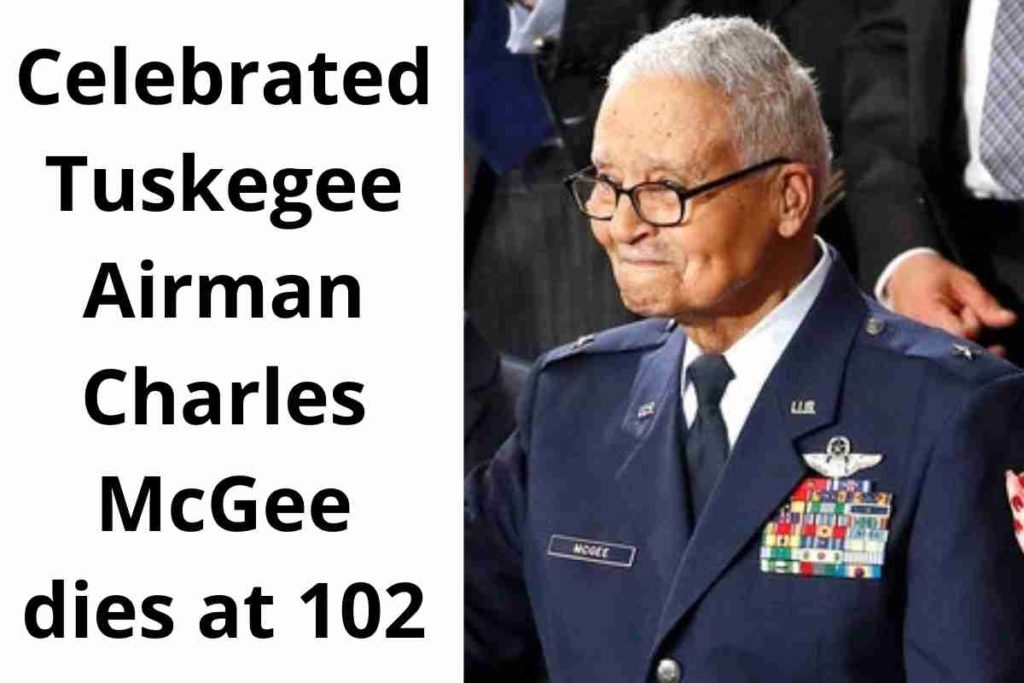Charles McGee, a well-known Tuskegee Airman, died at the age of 102.
WASHINGTON (CSU) — Charles McGee, a Tuskegee Airman who flew 409 fighter combat flights throughout three wars and later helped raise awareness about Black pilots who had to overcome racism at home in order to fight for freedom abroad, died on Sunday. He has attained the age of 102.
McGee died gently at home in Bethesda, Maryland, according to his son, Ron McGee.
McGee left the University of Illinois when the United States entered World War II to join an experimental program for Black troops who wanted to train as pilots when the Army Air Corps admitted them. According to his biography on the National Aviation Hall of Fame website, In October 1942, he was assigned to the Tuskegee Army Air Field in Alabama for pilot training.
“You may argue that one of the things we were fighting for was equality,” he stated in a 1995 interview with The Associated Press. “We discovered that we share, if not transcend, similar features,” we explained.
McGee completed flight school in June 1943 and joined the 332nd Fighter Group, better known as the “Red Tails,” in early 1944. As part of a group that accompanied bombers over Europe, he flew 136 flights.
Between 1940 and 1946, Tuskegee trained almost 900 men. Around 450 soldiers were transported overseas, with 150 of them dying in training or action.
The Tuskegee Airmen have been the focus of books, films, and documentaries in recent years, showcasing their bravery in the air and the doubts they faced on the ground due to their race. In 2007, they were awarded the Congressional Gold Medal, the nation’s highest civilian honor, for their “exceptional military record that sparked a revolutionary transformation in the Armed Forces.”
McGee stayed in the Army Air Corps, then the United States Air Force, for another 30 years. During the Korean War, he flew low-level bombing and strafing missions before returning to combat during the Vietnam War. His 409 aerial fighter combat sorties in three wars, according to the National Aviation Hall of Fame, remain a record.
In 1973, he retired as a colonel from the Air Force and went on to earn a bachelor’s degree in business administration and work as a company executive. He was given an honorary appointment at the age of 100, elevating him to the one-star rank of brigadier general. To mark his centennial year, he flew a private jet between Frederick, Maryland, to Dover Air Force Base in Delaware.
When President Donald Trump introduced McGee during his State of the Union speech in 2020, members of Congress gave him a standing ovation.
McGee was a source of knowledge on the Tuskegee Airmen and offered a unique viewpoint on racial relations in the era through the airmen’s nonprofit educational organization, in addition to encouraging young men and women to seek careers in aviation.
“At the time of the war, the concept of an all African American aircraft squadron was radical and disagreeable to many,” McGee wrote in an essay for the Smithsonian National Air and Space Museum.
“The general consensus was that blacks lacked the intelligence and guts to serve as military pilots. ‘The Negro type does not have the required reflexes to create a first-rate fighter pilot,’ wrote one commander. Men like him were proven wrong by the Tuskegee Airmen.”
On Dec. 7, 1919, Charles Edward McGee was born in Cleveland to a pastor father who also served as a teacher, social worker, and military chaplain. He received his high school diploma from Chicago in 1938.
Charlene McGee Smith and Yvonne McGee, as well as ten grandchildren, 14 great-grandchildren, and a great-great-grandchild are among the survivors. Frances, his wife of more than 50 years, died in 1994.
McGee was hailed as “a living legend known for his kind-hearted and humble personality, who saw optimism at every turn,” according to a family statement.
In tweets commemorating McGee on Sunday, Vice President Kamala Harris and Defense Secretary Lloyd J. Austin III both called him an American hero.
“While I’m grieved by his passing, I’m also appreciative for his sacrifice, legacy, and character.” “General, may you rest in peace,” Austin wrote.
McGee started in his Smithsonian essay that he was frequently asked why the Tuskegee Airmen were so successful in battle.
He wrote, “I would say it was due to our courage and perseverance.” “As kids, we wanted to be pilots but were told it wasn’t feasible. We surmounted great challenges thanks to our faith and determination. This is a lesson that every young person should learn.”
“I am most proud of my job as a Tuskegee Airman in helping to break down racial boundaries and fight the Nazis,” he continued.
Follow us on Twitter
Also Read 8 Arrested in Operation Targeting Violent Crime in Carlsbad





